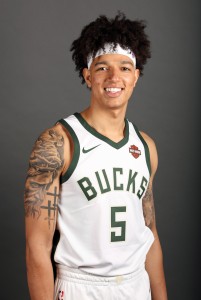Team and player options on veteran contracts must be exercised by the end of June before the new league year begins on July 1, but the same rules don’t apply to team options in rookie scale contracts. First-round picks who signed standard rookie contracts have third- and fourth-year options included in their deals, and those options must be exercised – or declined – seven months early.
The deadline for rookie scale option decisions is October 31, which means that teams have about another month to decide whether to pick up those options for the 2019/20 season.
It’s an unusual structure, one that forces teams to make decisions before seeing how their players will perform on the court that season. Last fall, for instance, the Magic turned down their fourth-year option on Mario Hezonja for 2018/19. Hezonja subsequently enjoyed his best season as a pro, and instead of entering the final year of his rookie contract with Orlando, he was able to hit the open market and secure a larger salary with the Knicks.
Cases like Hezonja’s are rare, however. For the most part, teams will exercise their rookie scale options, particularly third-year options. Third-year options are generally pretty affordable, and decisions are due after a player has been in the NBA for just one season, so clubs are reluctant to give up on their first-round picks that early.
Still, while many of this year’s rookie scale option decisions will be no-brainers, there are at least a small handful of players who aren’t locks to have their options picked up. Here’s a look at five players who fall into that category:
 D.J. Wilson, Bucks (third year, $2,961,120): Wilson had some good games in the G League last season, but his overall NBAGL numbers were just okay for a first-round pick, and he only played 72 minutes in 22 NBA games. As noted above, teams often don’t give up this early on first-round picks, and Wilson’s cap charge is affordable enough that it’s probably worth securing him for at least one more year. This isn’t a slam-dunk though.
D.J. Wilson, Bucks (third year, $2,961,120): Wilson had some good games in the G League last season, but his overall NBAGL numbers were just okay for a first-round pick, and he only played 72 minutes in 22 NBA games. As noted above, teams often don’t give up this early on first-round picks, and Wilson’s cap charge is affordable enough that it’s probably worth securing him for at least one more year. This isn’t a slam-dunk though.- Malachi Richardson, Raptors (fourth year, $2,581,597): When the Raptors sent Bruno Caboclo to Sacramento in exchange for Richardson at last season’s trade deadline, it reduced their 2017/18 payroll and increased their flexibility to make a move on the buyout market. But it also meant taking on Richardson’s guarantee for 2018/19, while Caboclo’s contract expired. Richardson seems unlikely to have any sort of role this season on a deep, talented Toronto team, and with the club at risk of being in the tax again in 2019/20, I don’t expect the Raps to lock in Richardson for another year.
- Guerschon Yabusele (third year, $3,117,240): While the “Dancing Bear” has no shortage of fans in Boston, it’s hard to see how he’ll earn playing time in a frontcourt that features Al Horford, Aron Baynes, Semi Ojeleye, Daniel Theis, and first-rounder Robert Williams — especially if Jayson Tatum and/or Gordon Hayward see significant minutes at the four. Yabusele has promise, but with the Celtics now in the tax, it might make sense to use his roster spot on a minimum-salary player starting in 2019/20.
- Malik Beasley, Nuggets (fourth year, $2,731,714): Denver’s lack of reliable backcourt depth bodes well for Beasley, who could parlay a solid Summer League showing into a regular backup role at shooting guard. The Nuggets don’t have serious tax concerns for 2019/20, so exercising Beasley’s modestly-priced option wouldn’t be a major risk. Still, it would be an easier decision if he’d shown more improvement in his sophomore season. Instead, he posted just 3.2 PPG on 41.0% shooting in 62 games in 2017/18.
- Justin Patton, Timberwolves (third year, $3,117,240): After missing nearly all of his rookie season due to foot problems, Patton has undergone another foot procedure this month, raising some doubts about his availability for the 2018/19 season. Nonetheless, I expect the Timberwolves will want to give Patton another chance to get healthy before cutting their losses on him, particularly since he may soon be the lone piece remaining from last summer’s trade with the Bulls.
For a full breakdown of this year’s decisions on 2019/20 rookie scale options, click here.
Photo courtesy of USA Today Sports Images.
I think the Pacers want to see how much Myles Turner improves his rebounding before deciding how much to pay him.
I love the comments that have not one thing to do with the article.
I think diet Dr Pepper tastes nothing like regular Dr Pepper.
Dude, Myles is up for his rookie scale “extension” by October 1. You are right, they aren’t the same thing. Oh well!
article targeted rookies in jeopardy to NOT having their contracts exercised – myles turners looking at max money